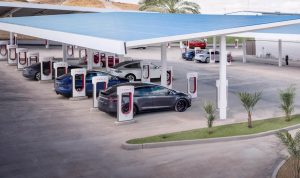Why Tesla’s Charging Stations Are A Key Advantage For Its Future

Minneapolis-based venture capital firm Loup Ventures sees charging infrastructure as being a key advantage for Tesla Inc (NASDAQ: TSLA) to maintain its dominant position, now and in the future.
What Happened: U.S. President Joe Biden is pushing to add more than 500,000 charging stations over the next four years.
Many investors believe this will favor traditional automakers, but Loup says that’s not necessarily the case.
“We see it as a positive for both, given EV adoption is still nascent at about 2% of new vehicle sales in the U.S., and building out charging infrastructure should aid broader adoption for all automakers,” Loup Ventures said in a note.
Gene Munster and David Stockman from Loup Ventures lay out the case for Tesla’s charging stations being a key advantage.
Why It’s Important: Non-Tesla EVs rely on third-party charging stations that are inferior in quality and availability, according to Loup Ventures.
“While the price and quality value proposition of their vehicles is the main reason for this success, we believe their charging network is another,” Loup Ventures said.
Tesla has more charging stations available than its EV rivals. There are more than 4,900 high-speed charging stations (combining Tesla and third-party locations) available to Tesla customers in the U.S., compared to over 3,900 for just non-Tesla customers.
With an adapter, Tesla EVs can charge at non-Tesla locations. The same cannot be said about Tesla charging stations, as they are exclusive to those EVs.
This means Tesla does not have to work with other companies to decide where to build stations, said Loup Ventures. “This allows them to be more efficient, strategically deploying chargers where consumers need them,” Loup Ventures said in the report. “We believe Tesla’s vertically integrated, proprietary charging network will continue to be an advantage for the company for the foreseeable future.”
Loup Ventures pointed to the fact that Tesla offered to license patents to create an open standard for charging EVs in 2014, but no automotive companies took up the offer.